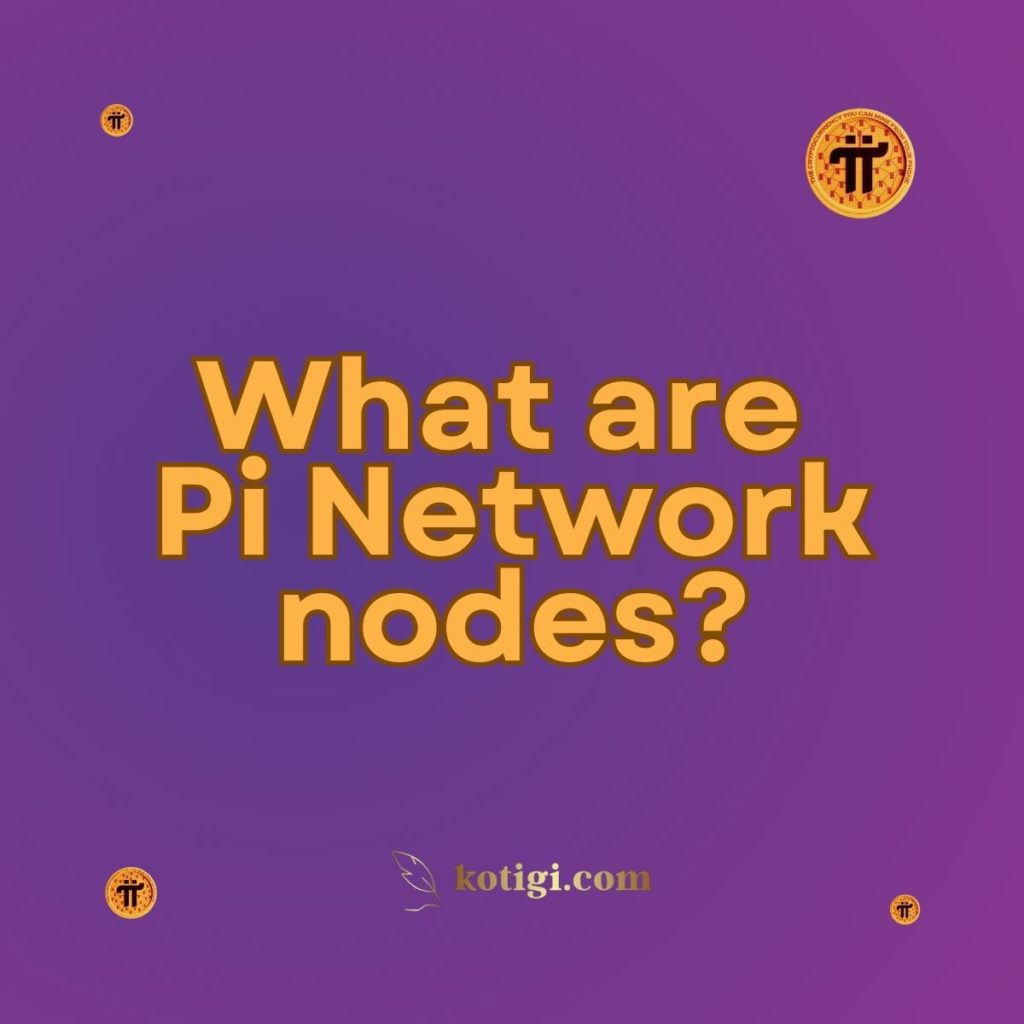
What are Pi Network nodes?
Pi Network nodes are integral components of the network’s decentralized architecture, responsible for maintaining the blockchain, validating transactions, and facilitating communication among users. They ensure the security and efficiency of the Pi Network by working collaboratively to uphold its integrity.
Introduction
In the realm of blockchain technology, the term “node” refers to any device that participates in the network, performing specific functions that help maintain its integrity and security. Nodes are the backbone of any decentralized system, ensuring that transactions are verified, recorded, and communicated efficiently across the network. In the context of the Pi Network, nodes play a crucial role in the network’s mobile-first approach to cryptocurrency mining and community building.
The Pi Network distinguishes itself by allowing users to mine Pi coins using their mobile devices without the need for extensive computational power. This unique approach makes cryptocurrency accessible to a broader audience, but it also relies on a robust network of nodes to facilitate transactions and maintain security. Understanding the role of nodes in the Pi Network is essential for anyone interested in its underlying technology and ecosystem.
In this blog post, we will explore what Pi Network nodes are, their functions, types, and the importance of nodes within the broader context of the Pi Network. We will also discuss the benefits and challenges associated with node participation and how users can get involved in this aspect of the network.
1. Understanding Nodes in Blockchain
Definition of Nodes
In the context of blockchain technology, nodes are devices or computers that participate in the network. They maintain a copy of the blockchain and perform various functions, such as validating transactions, broadcasting information, and participating in consensus mechanisms. Each node contributes to the overall health and security of the blockchain.
Nodes can be classified into different types based on their functions and the roles they play in the network. These classifications often include full nodes, light nodes, and mining nodes, each serving distinct purposes within the blockchain ecosystem.
Importance of Nodes
Nodes are essential for the functioning of any blockchain network. They contribute to several critical aspects:
- Transaction Verification: Nodes verify transactions to ensure they are valid and comply with the network’s rules. This verification process prevents fraudulent activities and maintains the integrity of the blockchain.
- Consensus Maintenance: Nodes participate in the consensus mechanism, helping to maintain agreement among network participants regarding the state of the blockchain. This consensus is crucial for ensuring that all nodes agree on the validity of transactions.
- Data Distribution: Nodes help distribute data across the network, ensuring that all participants have access to the latest information. This decentralization enhances security and reduces the risk of a single point of failure.
- Network Security: By participating in the validation and consensus processes, nodes contribute to the overall security of the blockchain. They help protect the network against attacks and unauthorized activities.
Types of Nodes
In blockchain networks, nodes can be categorized into several types, including:
- Full Nodes: These nodes maintain a complete copy of the blockchain and validate all transactions. Full nodes play a crucial role in ensuring network security and integrity.
- Light Nodes: Light nodes, or lightweight nodes, do not store the entire blockchain. Instead, they rely on full nodes for information, making them more efficient for devices with limited resources.
- Mining Nodes: In networks that utilize proof-of-work (PoW) or similar consensus mechanisms, mining nodes are responsible for validating transactions and creating new blocks. These nodes often require significant computational power.
Understanding these types of nodes is essential for grasping the specific role of nodes within the Pi Network.
2. Pi Network Nodes: An Overview
What are Pi Network Nodes?
In the Pi Network, nodes refer to the devices that participate in the network’s decentralized architecture. These nodes help maintain the blockchain, validate transactions, and facilitate communication among users. Unlike traditional blockchain networks that require extensive computational resources, Pi Network nodes operate on mobile devices, making it accessible to a broader audience.
Pi Network nodes are critical for ensuring the security and efficiency of the network. They work collaboratively to verify transactions, uphold consensus, and prevent fraudulent activities. By leveraging a mobile-first approach, the Pi Network empowers users to actively participate in the network without the barriers associated with traditional mining methods.
Roles and Responsibilities of Pi Network Nodes
The roles and responsibilities of Pi Network nodes include:
- Transaction Verification: Nodes validate transactions submitted by users, ensuring they comply with the network’s consensus rules. This verification process is crucial for maintaining the integrity of the blockchain.
- Maintaining the Blockchain: Nodes are responsible for maintaining a copy of the blockchain and ensuring that it is up to date. This role is essential for ensuring that all participants have access to accurate information.
- Consensus Participation: Nodes participate in the consensus process, helping to maintain agreement among network participants. This consensus ensures that all nodes agree on the state of the blockchain.
- Facilitating Communication: Nodes facilitate communication among users, broadcasting transaction information and updates across the network. This role enhances connectivity and ensures that users remain informed.
How Pi Network Nodes Differ from Traditional Nodes?
Pi Network nodes differ from traditional blockchain nodes in several key ways:
- Mobile-First Approach: Pi Network nodes primarily operate on mobile devices, allowing users to mine Pi coins easily without the need for extensive computational resources. This accessibility sets it apart from traditional mining networks.
- Community-Driven: Pi Network emphasizes community participation, encouraging users to engage actively in the network. This community-driven approach fosters a sense of ownership among users.
- Low Resource Requirements: Unlike traditional mining nodes that require significant hardware and energy, Pi Network nodes can function efficiently on standard mobile devices, making it accessible to a wider audience.
By understanding these differences, users can appreciate the unique structure of the Pi Network and the role of nodes within it.
3. Types of Nodes in Pi Network
Validator Nodes
Validator nodes are a crucial component of the Pi Network’s architecture. These nodes are responsible for verifying transactions and maintaining consensus within the network. Validator nodes play an essential role in ensuring that transactions are legitimate and that the blockchain remains secure.
Selection Criteria for Validator Nodes
To become a validator node in the Pi Network, users must meet specific criteria, including:
- Reputation: Users with a positive reputation in the community are more likely to be selected as validator nodes.
- Staking Requirements: Validator nodes may be required to stake a certain amount of Pi coins, demonstrating their commitment to the network.
- Community Support: Validator node selection may involve community voting, ensuring that users have a say in the governance of the network.
Standard Nodes
Standard nodes, also known as regular nodes, participate in the Pi Network without the additional responsibilities of a validator. These nodes contribute to the network’s overall functionality by validating transactions and helping to maintain the blockchain, albeit with a reduced role compared to validator nodes.
Features of Standard Nodes
Standard nodes have the following features:
- Transaction Verification: Like validator nodes, standard nodes verify transactions to ensure their legitimacy and adherence to network rules.
- Blockchain Maintenance: Standard nodes help maintain an up-to-date copy of the blockchain, ensuring that users have access to accurate information.
- Lower Resource Requirements: Standard nodes can operate on mobile devices, making participation in the Pi Network more accessible to a broader audience.
Other Node Types
While validator and standard nodes are the primary types in the Pi Network, additional node types may emerge as the network evolves. These could include:
- Developer Nodes: Nodes that contribute to the development of applications and services within the Pi Network ecosystem.
- Mining Nodes: As the network transitions from the test phase to a fully operational blockchain, mining nodes may emerge to validate transactions and create new blocks.
Understanding these node types helps users appreciate the diverse roles that nodes play within the Pi Network.
4. How to Become a Node in Pi Network
Joining the Pi Network
To become a node in the Pi Network, users must first join the network by downloading the Pi Network app and creating an account. The onboarding process is straightforward and accessible, allowing users to start mining Pi coins easily.
Becoming a Validator Node
For users interested in becoming validator nodes, the following steps are typically involved:
- Building Reputation: Users must actively participate in the community, engaging with others and contributing positively to the network.
- Meeting Staking Requirements: If applicable, users may need to stake a certain amount of Pi coins to be considered for validator node status.
- Community Engagement: Users should participate in discussions and governance processes, as community support can play a role in validator selection.
Responsibilities of Node Operators
Once users become nodes in the Pi Network, they have specific responsibilities, including:
- Verifying Transactions: Nodes must actively verify transactions and ensure they comply with network rules.
- Maintaining Blockchain Integrity: Nodes should keep their blockchain copies up to date and report any discrepancies.
- Participating in Consensus: Nodes need to engage in the consensus process, helping to maintain agreement among participants.
By understanding these responsibilities, users can better appreciate their role within the Pi Network.
5. Benefits of Being a Node in Pi Network
Earning Pi Coins
One of the primary benefits of being a node in the Pi Network is the ability to earn Pi coins. Users who participate as nodes can accumulate coins through the mining process, increasing their holdings and contributing to the network’s growth.
Contributing to Network Security
Nodes play a crucial role in ensuring the security of the Pi Network. By verifying transactions and maintaining the blockchain, nodes help protect the network against fraudulent activities and potential attacks. This contribution fosters a sense of community and shared responsibility.
Enhancing Community Engagement
Being a node in the Pi Network encourages users to engage actively with the community. Nodes often participate in discussions, share knowledge, and support other users, fostering a sense of belonging within the network.
Gaining Access to New Features
As the Pi Network evolves, nodes may gain early access to new features, applications, and services. This advantage allows node operators to stay informed about developments within the ecosystem and participate in shaping its future.
Building Reputation
Active participation as a node can enhance a user’s reputation within the community. A positive reputation can lead to increased trust and collaboration with other users, contributing to a vibrant ecosystem.
6. Challenges of Being a Node in Pi Network
Technical Challenges
Operating a node in the Pi Network can present technical challenges, including:
- Connectivity Issues: Nodes require a stable internet connection to verify transactions and communicate effectively with the network.
- Device Compatibility: Not all mobile devices may be compatible with the Pi Network app, limiting participation for some users.
Security Concerns
While nodes contribute to network security, they also face security risks, including:
- Phishing Attacks: Nodes must remain vigilant against phishing attempts, ensuring they do not fall victim to scams that could compromise their accounts.
- Data Privacy: Users must be cautious about sharing personal information within the network to protect their privacy.
Community Dynamics
The Pi Network relies heavily on community engagement, which can sometimes lead to challenges, including:
- Governance Disputes: Community voting and governance processes may lead to disagreements, affecting the overall direction of the network.
- Reputation Management: Users must actively manage their reputation to maintain trust within the community, which can be challenging in a decentralized environment.
7. Future of Nodes in Pi Network
Expanding Node Participation
As the Pi Network continues to grow, there will likely be opportunities for more users to become nodes. This expansion can enhance the network’s security and decentralization, promoting a more robust ecosystem.
Technological Advancements
Future developments in technology may lead to improvements in node functionality, including enhanced user interfaces, better communication tools, and streamlined processes for transaction verification.
Strengthening Community Governance
The future of nodes in the Pi Network will likely involve a stronger emphasis on community governance. By empowering nodes to participate in decision-making processes, the network can foster a sense of ownership among its members and promote collaboration.
Fostering Innovation
As the Pi Network evolves, nodes will play a key role in fostering innovation within the ecosystem. By collaborating with developers and users, nodes can help identify opportunities for new features and applications, contributing to the network’s long-term success.
Conclusion:
Pi Network nodes are integral to the functioning of the network, playing vital roles in transaction verification, blockchain maintenance, and community engagement. By participating as nodes, users contribute to the security and efficiency of the Pi Network while also benefiting from the opportunity to earn Pi coins and engage with a vibrant community.
As the Pi Network continues to grow and evolve, the importance of nodes will only increase. Their ability to adapt to challenges, promote user engagement, and foster innovation will be instrumental in the network’s long-term success. Understanding the role of nodes in the Pi Network is essential for anyone interested in the future of this innovative and accessible cryptocurrency.
Key Takeaways:
- Pi Network nodes are devices that participate in the network’s decentralized architecture, responsible for maintaining the blockchain, validating transactions, and facilitating communication.
- Nodes play crucial roles in transaction verification, consensus maintenance, and data distribution, contributing to the overall health and security of the blockchain.
- The primary types of nodes in the Pi Network include validator nodes and standard nodes, each serving distinct functions within the ecosystem.
- Users can become nodes by joining the Pi Network, building a positive reputation, and actively participating in community engagement.
- Being a node in the Pi Network offers benefits such as earning Pi coins, contributing to network security, and gaining access to new features.
- Challenges of node participation include technical issues, security concerns, and community dynamics that may affect governance and reputation management.





